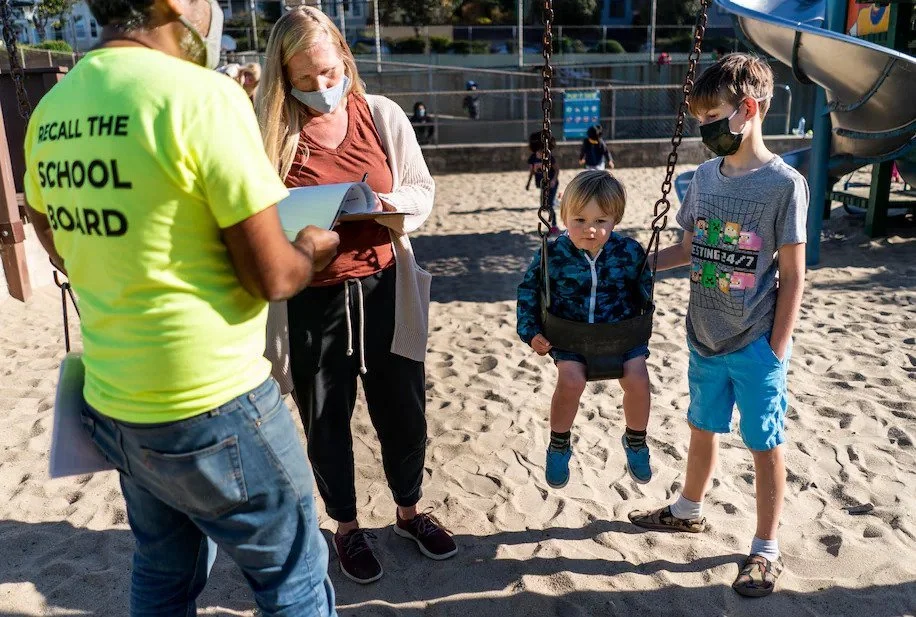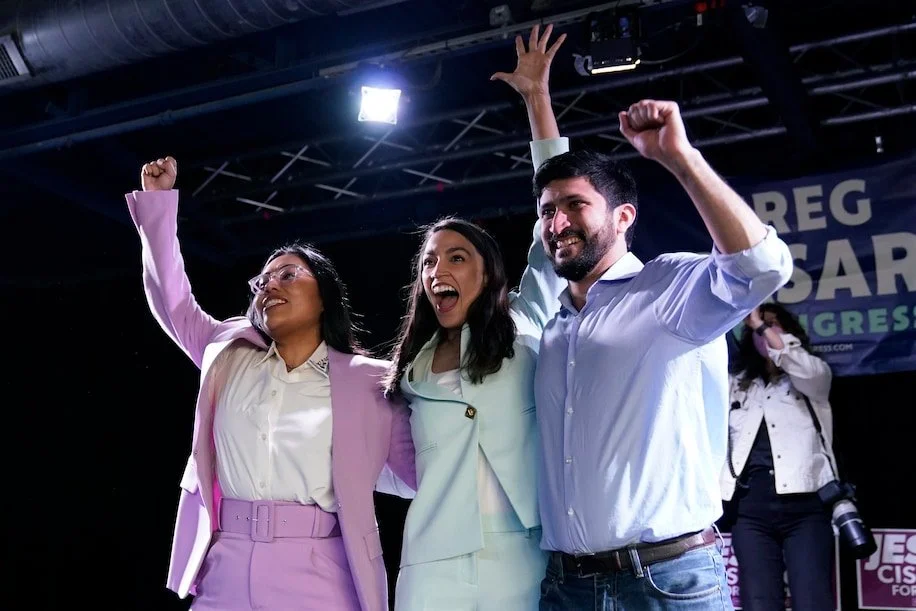In San Francisco and elsewhere, Democrats fight Democrats over where they stand
Siva Raj, a volunteer, seeks signatures for a petition last April to recall three members of the school board in San Francisco. (Melina Mara/The Washington Post)
By Sean Sullivan and David Weigel
As Democrats look fearfully toward the midterm elections, many of the party’s candidates, strategists and voters are recoiling from some of the left-wing proposals that gained prominence during the Trump administration.
While they helped channel widespread anger with the former president’s rhetoric and policies while he was in office, many Democrats now see them as too extreme and harmful to Democratic prospects this fall. Others who opposed them previously are speaking up more emphatically. The result is a growing backlash against more-liberal officeholders, challengers and plans.
In multiple states, Democrats running in competitive areas are scrambling to push back against the “defund the police” movement embraced by far-left activists, with some forced to try explaining past associations with the controversial slogan. President Biden has maintained his distance by touting federal funding that can be used to put more officers on the beat amid a rise in violent crime, as opposed to cutting their numbers.
In the left-leaning cities of Minneapolis and Austin, voters last year have embraced more conservative policies on policing and homelessness, as have candidates for mayor this year in the nation’s second-largest Democratic city, Los Angeles.
In San Francisco, the latest battle among Democrats over how far left the party should move came to a resounding conclusion as voters this week fired three school board members who veered too close to the edge even in a city that is a bastion of liberal activism.
Among their actions: the officials had moved to rename schools honoring figures such as Abraham Lincoln, whom they deemed flawed; sought to diversify an elite high school with an overwhelmingly Asian American and White student body by ending merit-based admissions; and imposed a lengthy pandemic absence from in-person learning. Even the city’s Democratic mayor backed their recall.
“I’ve always thought of myself as a progressive — until now, recently, when I’m looking at this situation,” said Siva Raj, 49, who launched the San Francisco recall effort with his partner, Autumn Looijen. “I’m shocked — like, how can progressives be for something like this? This is not me. These are not the values that I buy anymore.”
While slogans like “Abolish ICE” and calls to renounce Lincoln were never representative of the broader Democratic Party, Republicans have deftly weaponized them, tagging all of their opponents with attacks that have resonated in part because Democrats have often been reluctant to respond directly lest they highlight their own divisions, party strategists said. The combination of Biden’s poor approval ratings and the history of first midterms being tough for the president’s party has added more urgency to Democrats’ desire to find an effective counterpunch.
But many in the left reject the notion that their ideas on education, policing, racial equity and other issues are a liability for the party. They attribute the party’s political problems to more moderate Democrats who have stood in the way of the president’s ambitious agenda, a defiance that has set the stage for a fierce battle in coming months.
At rallies over the weekend for candidates in Texas, Rep. Alexandria Ocasio-Cortez (D-N.Y.) blamed Democratic woes on centrists such as Sen. Joe Manchin III (D-W.Va.), who blocked Biden’s domestic spending plan.
“If you’re upset about Build Back Better, you can elect Jessica Cisneros,” said Ocasio-Cortez, referring to Biden’s proposal and a congressional candidate in Texas trying to unseat a Democratic incumbent.
Yet her side of the party schism is undeniably under siege. High-profile far-left candidates in last year’s race for mayor of New York and in a special election for the U.S. House in Ohio were defeated by more moderate Democratic opponents.
The next test of party direction will come March 1, when moderate Democrat Rep. Henry Cuellar — whose home and campaign office were raided by the FBI earlier this year — squares off in a primary rematch in South Texas against liberal challenger Cisneros, whom he narrowly defeated in 2020 and who has attracted high-profile liberal endorsements. Cuellar has said the investigation will show “no wrongdoing” on his part.
At weekend rallies with Cisneros and Greg Casar, an Austin city councilman running for Congress, Ocasio-Cortez singled out centrists who have opposed sweeping Democratic plans. “We know it’s not just Manchin,” she said at a rally in San Antonio.
Cuellar has sought to cast Cisneros as weak on immigration and border security, issues that have long stoked debate in the Democratic Party.
Rep. Alexandria Ocasio-Cortez (D-N.Y.), center, joins a rally for Democratic congressional candidates Jessica Cisneros, left, and Greg Casar, right, on Feb. 12 in San Antonio. (Eric Gay/AP)
Some Democrats argue that issues that divide the left and more moderate party forces were being hyped by Republicans to win votes. Former congressman and presidential candidate Beto O’Rourke, who is running for governor of Texas, said in an interview that Republicans were “pitting parents against teachers” with campaigns to keep some materials about race and gender out of schools.
“The driver for most people is, the kind of job they have or that they want to have, and whether that’s going to be an opportunity for them — whether their kid’s school is getting the resources [it needs], whether their kid’s teacher is paid enough,” he said.
But other Democrats say the party has made a mistake in seeking to deflect such attacks rather than meeting them head-on. “I think if there’s a broader lesson here for all Democrats, left or moderate, it’s that we need to define what we’re standing for,” said Celinda Lake, who was one of Biden’s top pollsters in 2020. “We start in the middle of the conversation and we start in response rather than showing what we’re for.”
The Democratic schism is ideological and often generational, as younger, more liberal challengers take on established Democratic incumbents. Team Blue PAC, a political action committee spearheaded by a trio of House Democrats including Rep. Hakeem Jeffries (N.Y.), an early favorite to become the party’s next leader in the House, announced its first endorsements this week. Four of the five candidates had challengers who were previously endorsed or recruited by Justice Democrats — a liberal organization that has sought to unseat some Democratic incumbents. Team Blue PAC is aimed mainly at protecting incumbent members of Congress in safe Democratic seats that are not a focus of the House Democratic campaign arm.
Some of the candidates now trying to mute more liberal voices are having to face up to rhetoric they once used themselves. After New York state Sen. Alessandra Biaggi announced a run in the state’s new 3rd Congressional District, which connects suburbs around New York City and solidly backed Biden in 2020, the New York Post highlighted a social media posting she’d sent that year with the hashtag #defundthepolice.
In an interview, Biaggi said that she had been proud to stand with racial justice activists after the killing of George Floyd. She said she would continue to advocate for putting “more resources into social welfare programs, into education, into mental health resources, into gun violence prevention programs,” but no longer used the “defund” slogan.
“Unfortunately, the phrase doesn't fully capture that, and it's been so politicized and so many people believe that it is solely about cutting funds to police departments,” Biaggi said. “Using that phrase at that time was an act of solidarity. And I'm not ashamed of using that phrase, because that was what the world was experiencing emotionally at that time — and frankly, still is.”


